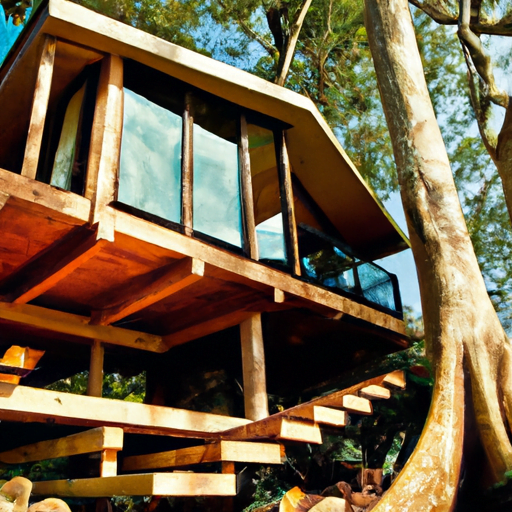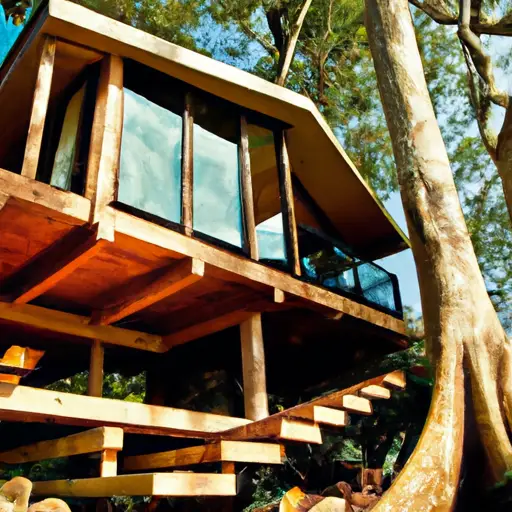Have you ever wondered what it would be like to live off-grid? To disconnect from the hustle and bustle of modern life and rely solely on renewable resources? Well, you’re in luck because today we’re going to explore off-grid living options in Florida. From the sunny beaches of Miami to the tranquil forests of the Panhandle, there are plenty of places in the Sunshine State where you can find your own slice of off-grid paradise.
When it comes to off-grid living, location is key. And in Florida, you have a variety of options to choose from. If you prefer the city life, Miami is a great choice. With its abundance of sunshine and access to the ocean, you can harness solar power and collect rainwater to sustain your off-grid lifestyle. If you’re more of a nature lover, the Panhandle offers a wealth of opportunities. From Apalachicola National Forest to St. George Island, there are plenty of secluded areas where you can live off-grid surrounded by untouched beauty.
In our upcoming article, we’ll dive deeper into the logistics of off-grid living in Florida. We’ll discuss the challenges you might face, such as finding suitable land and obtaining permits. We’ll also explore the different types of sustainable energy sources you can utilize, such as solar panels and wind turbines. So, if you’ve ever dreamed of escaping the rat race and embracing a simpler way of life, stay tuned for our in-depth look at off-grid living options in Florida.

Exploring Off-Grid Living Options in Florida
Are you tired of the hustle and bustle of city life? Do you dream of living a simpler, more self-sufficient lifestyle? If so, off-grid living may be just what you’re looking for. In this article, we will explore the concept of off-grid living, its advantages and challenges, legal considerations in the state of Florida, choosing the right location, various housing options, energy sources, water and waste management, and food production and storage. So let’s delve into the world of off-grid living and discover the possibilities it holds for you.
What is Off-Grid Living?
Definition of Off-Grid Living
Off-grid living refers to a lifestyle where individuals or families live without being connected to any public utilities such as electricity, water, or sewer systems. Instead, they generate their own power, collect and purify their water, and manage their waste in a self-sustaining manner. It is a way of life that aims to reduce dependence on traditional infrastructure and embrace self-sufficiency.
Basic Principles of Off-Grid Lifestyle
Living off-grid involves adopting a set of principles that promote self-reliance and sustainable practices. These principles include generating renewable energy, minimizing waste, conserving resources, and adopting environmentally friendly practices such as organic farming and permaculture. The off-grid lifestyle encourages individuals to take control of their basic needs and live in harmony with nature.
Benefits of Living Off-Grid
Living off-grid offers numerous advantages, making it an attractive option for many. One of the primary benefits is reduced dependence on utilities. By generating your own energy and managing your own water supply and waste, you become less vulnerable to power outages and water shortages. Additionally, off-grid living contributes to environmental sustainability, as it often relies on renewable energy sources and promotes responsible resource management. Moreover, embracing an off-grid lifestyle fosters increased self-sufficiency and resilience, empowering individuals to rely on their own skills and abilities.
Advantages of Off-Grid Living
Reduced Dependence on Utilities
One of the key advantages of off-grid living is the reduced dependency on traditional utilities. In Florida, where hurricanes and tropical storms are common, power outages can occur frequently. By generating your own electricity through solar panels or wind turbines, you can ensure that your household remains powered even during these disruptions. Similarly, by having your own water sources and waste management systems, you are not reliant on municipal water and wastewater services, giving you peace of mind in times of crisis.
Environmental Sustainability
Living off-grid allows you to significantly reduce your carbon footprint and minimize your impact on the environment. By utilizing renewable energy sources such as solar power, wind power, and hydroelectric power, you can drastically reduce your reliance on fossil fuels and decrease greenhouse gas emissions. Additionally, off-grid living often promotes sustainable practices such as composting and organic farming, contributing to healthier ecosystems and biodiversity.
Increased Self-Sufficiency and Resilience
Off-grid living fosters self-sufficiency and resilience by encouraging individuals to take control of their basic needs. By growing your own food, raising livestock, and utilizing food preservation methods, you become less dependent on commercial agriculture and food distribution systems. This self-reliance not only provides a sense of empowerment but also ensures that you have access to essential resources even during times of economic turmoil or natural disasters.
Challenges of Off-Grid Living
Limited Access to Modern Amenities
Living off-grid means sacrificing some of the modern amenities and conveniences that we often take for granted. Depending on your location and circumstances, you may need to adjust to a simpler lifestyle without access to high-speed internet, cable television, or even cell phone coverage in some remote areas. It requires a mindset shift and a willingness to embrace a more minimalist way of life.
Higher Upfront Costs
Transitioning to an off-grid lifestyle can come with significant upfront costs. Investing in renewable energy systems, water collection and purification systems, and quality off-grid housing options can be expensive. However, once these initial expenses are covered, the long-term cost savings can be substantial. It is essential to carefully plan and budget for these expenses to ensure a successful transition.
Maintenance and Troubleshooting Challenges
Living off-grid also requires a certain level of technical skills and knowledge to maintain and troubleshoot the various systems you rely on. From troubleshooting solar panels and battery systems to managing water filtration systems and off-grid appliances, you need to be prepared to handle any challenges that may arise. It may require continuous learning and a hands-on approach to address and fix any issues that come your way.

Legal Considerations for Off-Grid Living in Florida
Zoning and Building Codes
When considering off-grid living in Florida, it is crucial to familiarize yourself with local zoning and building codes. Each county may have its own regulations regarding minimum housing standards, solar panel installation, and waste management systems. Ensure that your off-grid plans align with these regulations to avoid any legal issues in the future.
Permits and Regulations
Before embarking on your off-grid living journey, it is essential to obtain any necessary permits and comply with all relevant regulations. For example, if you are building your own off-grid home, you may need to obtain a building permit and ensure that your construction adheres to local building codes. By understanding and following the legal requirements, you can ensure a smooth transition to off-grid living.
Renewable Energy Incentives
The state of Florida offers various incentives to promote the use of renewable energy sources. These incentives can help offset the initial costs of installing solar panels or other renewable energy systems. Research and explore the available incentives and rebates to make your off-grid living more affordable and financially viable.
Choosing the Right Location in Florida
Climate Considerations
Florida’s climate varies significantly from north to south, and it is important to consider the climatic conditions when selecting the right location for your off-grid living. For example, South Florida experiences a tropical climate, while North Florida has a more temperate climate. Consider factors such as rainfall, temperature, and wind patterns to ensure your chosen location aligns with your desired off-grid lifestyle.
Availability of Natural Resources
When choosing an off-grid living location, it is essential to assess the availability of natural resources such as water, sunlight, and wind. These resources are crucial for generating your own energy and maintaining a sustainable lifestyle. Look for areas with ample sunshine, consistent wind patterns, and access to water sources such as rivers, lakes, or even viable groundwater.
Proximity to Essential Services
While off-grid living emphasizes self-sufficiency, it is still important to consider the proximity to essential services such as hospitals, schools, and grocery stores. Even if you aim to produce most of your food and have your own healthcare provisions, having access to essential services in case of emergencies or unforeseen circumstances can provide peace of mind.
Off-Grid Housing Options
Building your Own Off-Grid Home
Constructing your own off-grid home allows you to tailor it to your specific needs and preferences. From choosing the ideal location and selecting the type of sustainable materials to designing the layout and integrating renewable energy systems, building your own off-grid home offers complete control over your living space.
Converted Shipping Containers
Another popular off-grid housing option is converting shipping containers into livable spaces. These containers provide a sturdy and portable base that can be customized to include living areas, bedrooms, kitchens, and bathrooms. With proper insulation and renewable energy systems, shipping container homes can be comfortable and eco-friendly off-grid dwellings.
Tiny Houses and RVs
Tiny houses and recreational vehicles (RVs) have gained popularity in the off-grid living community due to their compact size and mobility. These smaller living spaces offer the flexibility to relocate if desired while still providing the necessary amenities for comfortable off-grid living. They can be equipped with solar panels, composting toilets, and other off-grid essentials.
Earthships and Sustainable Architecture
Earthships are unique off-grid dwellings made from recycled materials such as tires, bottles, and earth-filled walls. They are designed to be entirely self-sufficient, utilizing passive solar heating, rainwater harvesting, and sewage treatment systems. Earthships are a prime example of sustainable architecture and off-grid living principles.
Energy Sources for Off-Grid Living
Solar Power
Solar power is one of the most common and reliable energy sources for off-grid living. Florida’s abundant sunshine makes it an ideal location for solar power generation. Installing solar panels on your off-grid property allows you to harness the power of the sun and convert it into electricity for your daily needs.
Wind Power
If you are situated in an area with consistent wind patterns, wind power can complement your energy needs. Wind turbines convert the kinetic energy of the wind into electricity, providing a sustainable and renewable source of power. However, it is essential to assess the wind resources in your specific off-grid location before investing in wind power.
Hydroelectric Power
For off-grid properties near rivers or other bodies of water, hydroelectric power can be a viable energy source. By utilizing the force of moving water, hydroelectric systems generate electricity. However, it may require proper permits and sufficient water resources for an effective hydroelectric setup.
Geothermal Energy
While not as commonly utilized in off-grid living, geothermal energy can be harnessed if you have access to geothermal heat sources. Geothermal systems utilize underground heat to warm or cool homes, reducing the need for traditional heating and cooling methods. It is an efficient and sustainable option if your off-grid property has access to geothermal resources.
Water and Waste Management
Harvesting and Purifying Rainwater
When living off-grid, rainwater harvesting is an essential practice that ensures a reliable water supply. Collecting rainwater in storage tanks or cisterns allows you to harness the abundant precipitation common in Florida. To make the collected rainwater potable, it can be filtered and purified through various methods such as UV sterilization or reverse osmosis.
Digging Wells and Using Groundwater
For off-grid properties situated in areas with accessible groundwater, digging wells can provide a consistent and independent water supply. By drilling a well and implementing proper filtration systems, you can access clean and freshwater without relying on municipal water sources.
Composting Toilets and Greywater Systems
Off-grid living often requires alternative waste management systems. Composting toilets are an environmentally friendly option that converts human waste into compost through a controlled decomposition process. Additionally, greywater systems allow you to reuse wastewater from sinks, showers, and appliances for irrigation purposes, minimizing water waste.
Food Production and Storage
Vegetable Gardens and Permaculture
Growing your own food through vegetable gardens and permaculture practices is a fundamental aspect of off-grid living. In Florida, the favorable climate allows for year-round cultivation of a variety of crops. By adopting organic farming methods, companion planting, and utilizing the principles of permaculture, you can generate a sustainable source of fresh produce.
Raising Livestock and Poultry
For a more self-sufficient off-grid lifestyle, raising livestock and poultry can provide a continuous source of meat, eggs, and dairy products. Florida’s warm climate supports various animals suitable for small-scale farming, such as chickens, goats, and rabbits. Raising these animals in a responsible and humane manner ensures a responsible approach to food production.
Food Preservation Methods
To make the most of your off-grid food production, it is essential to employ various food preservation methods. These methods, such as canning, freezing, dehydrating, and fermenting, allow you to store and extend the shelf life of your harvest. By preserving surplus produce, you can enjoy nutritious food year-round without the need for extensive refrigeration.
Conclusion
Off-grid living in Florida offers a unique opportunity to embrace a simpler, more sustainable lifestyle. By reducing reliance on traditional utilities, embracing renewable energy sources, and adopting responsible resource management practices, individuals can achieve self-sufficiency and resilience. With careful planning, consideration of legal requirements, and selection of the right location and housing options, you can embark on a fulfilling off-grid lifestyle. So, why not explore the off-grid living options in Florida and discover a new way of living that aligns with your values and aspirations?




